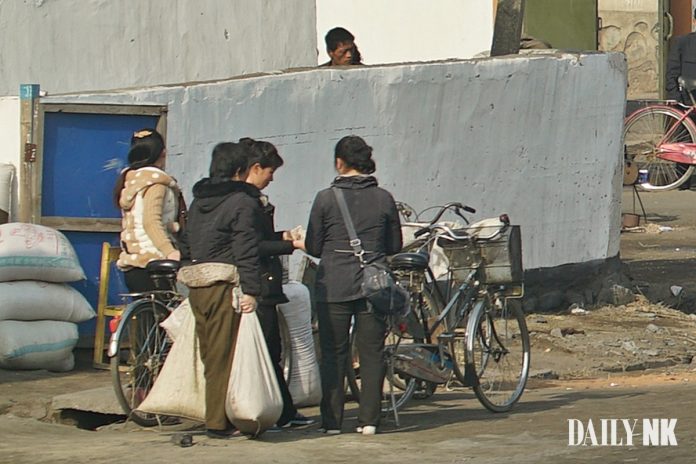
Inspection teams from Pyongyang recently raided grain processing facilities all across North Korea, Daily NK has learned.
The surprise inspections on facilities that manage and distribute rice, wheat, corn, and other grains are unprecedented in scale.
The government’s move to conduct mass inspections is a reflection of North Korean leader Kim Jong Un’s desire to uncover corruption involving illegal stockpiles of grain.
According to Daily NK sources in North Pyongan Province and South Hwanghae Province on Tuesday, the central government’s nationwide inspection of grain processing facilities began on Saturday. The Central Committee’s Economic Department and the Agricultural Commission — formerly the Ministry of Agriculture — have been directly entrusted with the inspections.
This contrasts with previous inspections, which were conducted autonomously in each locality. It also shows how much the authorities want to eradicate corruption, breaking with previous patched-together inspections that looked the other way.
The inspections will be relatively drawn out, too. The authorities plan to spend a month inspecting provincial-level efforts to administer grain, grain inflows and outflows, and how grain is stored and distributed.
The inspectors are taking a particularly close look to see if grainery ledgers accurately reflect grain stores. This suggests that the authorities already have an inkling that grainery officials are pilfering grain by falsely filling out ledgers.
According to Daily NK’s sources, the inspections came about after the failure of regional governments to carry out the party’s order to “normalize rations.”
Finding this failure strange, the Central Committee decided to secretly get to the bottom of the matter. In the process, it discovered that top officials at “special institutions” – such as provincial party committees, and among the administration, legal, and security establishment – had been storing grain for personal or business-related use in state-owned warehouses.
In short, despite Kim Jong Un’s emphasis on anti-corruption, leading provincial, city, and county officials had been unhesitatingly stockpiling rice in the warehouses of grain processing centers. “Key officials [at warehouses] received bribes to store the grain,” one of the sources told Daily NK.
Essentially, managers of the facilities were secretly providing warehouse storage for rice owned by individuals and organizations. “The managers took good care of the rice as a matter of practice, even attaching names to the illegal stockpiles, be it chief party secretaries, heads of the local branches of the Ministry of State Security or Ministry of Social Security, or members of local business management committees,” the source added.
While the managers provided the people with old, bug-eaten rice, cadres were given freshly harvested rice. In short, cadres at grain processing centers kept their jobs by colluding with upper-level cadres.
Secret “personal warehouses” were essentially operating throughout the country, creating what the North Korean authorities hate the most: personal fiefdoms. “The situation was such that Kim Jong Un was no longer the only person who received ‘special rice’ — provincial chief secretaries and even party secretaries in small towns were receiving ‘special rice’ as well,” another source told Daily NK.
Amid this corruption, local officials failed to carry out the government’s order to distribute grain based on Kim’s “grave decision” of June 2021.
At the time, military grain stores were empty, and localities failed to distribute enough rice to the population. The situation became so bad that Kim called this failure a “grave matter”; however, “not one grain of the special rice allotted for cadres was issued to the people, instead remaining safely in storage facilities,” the source said.
The party leadership was reportedly outraged at the continued pretensions of provincial, city and county cadres, whose rice remained absolutely sacrosanct despite Kim’s “special order” to distribute food rations.
Corrupt officials swept up in this latest set of inspections are expected to face tough punishments. Inspectors are already warning that the very act of stockpiling rice to “live free from fear of hunger” while the party is “running around trying to resolve public food shortages” will be regarded as an “anti-party, anti-people act.”
The inspectors are also threatening to confiscate illegal rice stockpiles, turning them over to the state.
News of the inspections is making its way to ordinary North Koreans, too. Many people hope that the rice — which failed to reach the people the first time after Kim’s special order — will finally be distributed to the public, Daily NK sources said.
Please direct any comments or questions about this article to dailynkenglish@uni-media.net.

















